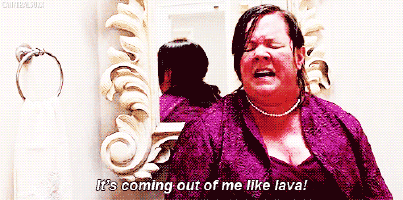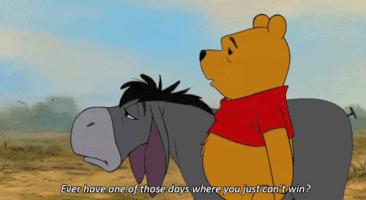Natalie Hart's Blog, page 9
April 19, 2016
Beloved
In the last couple of months, I’ve almost lost track of the number of times the word “beloved” has been aimed my way. It started in the communion circle, when the person offering me the elements said, “Natalie, you know this, you are God’s beloved.”
Immediately, I cried. Actually, it still makes me tear up.
On the Thursday before Easter, I went to the Garden Prayer service at The Revolution — an hour and half of prayer that started at 11pm. They removed several rows of chairs and circled the stage with pillows. The lights were low, the music was pulsing, and dry ice was blowing. Prayer time was not quiet. People stood, sat, bowed, curled over the pillow, cried out, spoke in tongues, moved around. The word that came to me often during that time: beloved. I was God’s beloved.
I sobbed. Loudly. Like I hadn’t since my marriage imploded in August.
The word kept leaping out at me from a variety of blog posts and sermons. And then last week, at the Renew and Refine Retreat the day before the Festival of Faith and Writing, the contemplative writer himself, Ed Cyzewski, provided this verse as one option for us to use for centering prayer:
I am my beloved’s, and his desire is for me. (Song of Songs 7:10, NRSV)
Yes, it’s from the sexy book of the Bible, but an argument can be made for reading it as an allegory of love between the Lord and His people, so that’s how I took it. For twenty minutes, I lay on my back on the floor of my church and focused on that, singing to myself an old youth group song,
I am His and He is mine, His banner over us is love.
I am His and He is mine, His banner over us is love.
I am His and He is mine, His banner over us is love.
His banner. Over us. Is love.
And then Ed and another organizer of the retreat stood in front of each person and said their name, followed by, “You are God’s beloved, and His desire is for you.” There were over thirty people in front of me, so I got to hear them say it over and over, and anticipate them saying it to me. I cried the whole time.
You see, it stings a little every time because it makes me realize that I am nobody else’s beloved, and that I wasn’t even my husband’s beloved while we were married. So there is grief.
But mostly I want to bask in the knowledge that I am God’s beloved, and that He has chosen me and will not stop choosing me. He treasures me; I am His treasure.
How precious are your thoughts about me, O God. They cannot be numbered! (Psalm 139:17, NLT)
I’m grateful for each person who has looked me in the eye and told me this. And for each person who will do it in the future. Because I’m not done needing to hear it. It still needs to soak further into my spirit, into my brain, into my heart before the need is not so acute. But I’m getting there…
Of course, this is not just true about me and God — it’s true about you and God, too.
You are God’s beloved. Bask in it.
March 22, 2016
The Pipe Organ Drug Mule Operation
The next time my youngest brother greets me with, “Hunter!” I’m going to toss my phone out the window. Then again, it’d mean he was still alive.
Three months ago he called me, saying only, “I got four photos heading your way. Call me after.”
I was expecting pics of a beautiful woman or maybe a baby. He was the kind of guy—I mean he is, he is the kind of guy who’d announce his fatherhood that way. But these were of an old organ in an even older stucco-walled church. “Where the hell are you?”
“Peru.”
“Is that a Hook and Hastings?”
His laughter sounded thin. “I don’t know, man. You’re the organ expert.”
I put my phone on speaker so I could flip through the photos while we talked. “Gotta be. Two manuals, nine stops. Tallest pipes probably eight feet. Case looks ten or twelve feet. I’d say nineteenth century. What’s it doing in a church in Peru? And what are you doing in a church? In Peru?”
“Neither of us are going to be here for much longer,” he said. “That’s where you come in.”
“You better start from the beginning.”
Steve spun a grand tale of too many Pisco Sours and new friends and overheard conversations, but it came down to this: his new friend was donating this old pipe organ to a chapel in Sao Paulo, Brazil, and, after Steve’s boasting, decided that I was the one to do it. “I’d need to free up a month and get visas—”
“How about this week! You don’t need a visa for Peru, and Brazil is waiving them for the whole summer because of the Olympics.”
“I can’t drop my clients and run away to South America.”
“We need to get this organ out of here before the rainy season makes the roads impassable.”
“The rainy season is in December. This is July.”
He gave a long, hearty, and totally false laugh. “Nothing like that! It’ll be an adventure. Trust me.”
My internal air pressure dropped. “Are you on speaker?”
“Are you nuts?”
Although there was nobody with me to overhear, I cupped the phone and spoke quietly. “Are you in trouble?”
“Of course!” He was back to the fake cheer. “He’ll pay double your usual fee once you get down here.”
“Is your new friend standing right there?”
“Make up an invoice on your company letterhead and bring it with you. Do you have a pen?”
I was furious and terrified and, damn him, curious, so I got a pen and wrote down the information he gave me before he pretended that our call got cut off in the middle of my next question. My next move was to call our four other brothers, but none of them had any more intel than I had. Steve had been off all our radar for months, but he did that all that time. It didn’t always mean he was in trouble.
I sighed.
If moving an antique beauty by one of America’s best organ manufacturers would somehow help him, I wouldn’t want him to go to anyone else. Once I presented my dilemma in the proper light, the clients I had to reschedule were kind of excited for me, so two days later, I was in Lima, hugging my brother while what I can only describe as his “minders” looked on.
They whisked us straight to a car and sped us through the city to a gated mansion. It had been sweltering when I’d left Austin, so the thirty-degree drop in temperature would have been a relief if I’d had any idea where we were or what was really going on. The room I was brought to was nice enough, but they made a big show of taking Steve down a different wing. And they took our phones.
When I finally met the big guy, Joaquin Rojas, if that was his real name, it was like I’d stepped into a parody of a South American movie: he was slick and shiny, wearing a wrinkled white linen suit, holding a fat cigar, opening his arms in a welcome that wasn’t quite friendly. There wasn’t much chit-chat before he said, “So, Mark, tell me. Why did Steven call you ‘Hunter’?”
I took a swig of my beer. “There are six boys in our family, and our dad and grandpa took us out shooting all the time. Out of the eight of us, no matter what we were hunting, I’d always be the first one to spot the prey, first one to bag it.” In what my ex-wife would call a ridiculous macho display, I didn’t smile.
He didn’t smile right back. “I’m always glad to meet a fellow hunter. Come. See my trophy room.”
His wasn’t my kind of hunting. I killed what I ate, what I could use, or what was a nuisance on the family ranch. Not gazelles and lions. But this was his house and I was entirely in his power, so I nodded. “Impressive.”
After regaling us with the story of each stuffed head, he brought forward one of the minders. “Tomorrow morning, Luis will go with you to the church outside Junin. There will be men there to help you. It must be done by nightfall. The next day, you load the truck, drive straight to the airport, load the plane, and stay with the cargo through customs in Sao Paulo. Then you will,” he paused, “be paid.”
There was no conversation after that, no discussion of security arrangements, or of who was in charge of bribes for local road checkpoints, all things Google had led me to believe would be necessary. Nobody had ever asked me what kind of packing supplies we’d need. After I was brought back to my room, I checked the door: locked. What had my brother gotten us into?
We left early the next morning, Steve driving, and Juan between us. The truck was beat-up but it was big enough, and the back was full of packing blankets and tarps. Luis was a little more forthcoming than Joaquin: Steve and I were in charge of bribes, and there were some guns and ammo in the back of the cab, if we needed them.
The scenery was dramatic—mountains, valleys, lush vegetation, even a road blockade of slow-moving sheep—and we passed through two checkpoints of local militias with serious weaponry, but I barely registered any of it. There was no way this was about an organ, but did I really want to figure out what it was about? Even if I’d wanted to try, I couldn’t get the chance. Luis never left my side, not even when I was taking a piss on the side of the road.
Five hours later, we got to the town and the church, a nice, textbook painted stucco building, a little run-down but solid, which was how I’d describe the Hook and Hastings. The church wasn’t on the jungle side of Peru, so she hadn’t had to deal with that level of humidity. There was very little mildew on the wood or rusting on the pipes. The decorative paint on the exterior pipes was flaking. Some mice had gotten into the leather back in the racks, but not too badly. I might have giggled a little when I discovered that the bellows were still hand-operated. Steve and Luis let themselves be pressed into service, and we cranked her up. She was out of tune, to be sure, but she could still make an impressive sound.
But orders were that she be dismantled by that night, so I couldn’t play for long. They went to fetch the men we were promised while I laid out blankets on the floor to stage the wrapping of the pipes. I’d dismantled one rank by the time help arrived. It wasn’t long before all four hundred and seventy-nine pipes stretched around the sanctuary. I picked up one end of an eight-foot viola and blew, startling everyone with that lovely, rich low note. Soon, all the men were picking up pipes and blowing.
In the commotion, I sidled up to Steve, but he shook his head before I could ask anything. As Luis led me away to where I’d be staying that night, I caught Steve’s eye and scratched my ear, throwing a little “phone” sign, but he shook his head again. The next day, when I picked up a fully wrapped four-foot pipe, I had to replant my feet and strain to lift it.
Fuck.
It was a lot heavier than it’d been yesterday. I glared at Steve, but he did the same thing as yesterday: shook his head.
I’d put off my loyal, paying customers and flown thousands of miles to rescue my brother and provide a gloss of respectability to some kind of pipe organ drug mule operation. It was almost funny, but I clenched my jaw to keep from laughing, since that would likely end in crying. This was bad.
There was no choice but to see it through. I supervised the loading of the truck and we were off by noon—me with one of those rifles by my side. Luis didn’t bat an eye when I insisted on it, which told me everything I needed to know.
We were pulled over by the first militia, who accepted both bribes Steve gave them, but they still wanted to look in the back. I gave them the work order and photos of the organ I’d printed back in Austin, as well as the hand-written inventory I’d made over the last two days. They kept asking questions, which I’d answer in increasingly technical language that nobody could translate, until I finally crawled into the back of the truck, pulled out one of the tiny pipes and played it. That seemed to do the trick—that and one more bribe.
It was the same story at the second checkpoint, but they held us longer, not even letting us get out of the truck for at least an hour. By the time we got free, it was dusk. I held on to the rifle and kept my gaze glued to the side view mirror. Soon enough, two sets of headlights came at us from the rear, while a slowpoke pick-up held us up in the front. What a lovely trap they were planning.
“Hunter,” was all Steve said.
Once we had a brief straightaway, I lowered the window and pushed myself halfway out. It was two seconds’ work to sight the front passenger tire of one of the vehicles behind us and pull the trigger. One car disabled.
I swung around and shattered the back window of the pick-up. Two men popped up in the bed and before they could get their weapons high enough to shoot, my sniper training took over and got both of them. Without pausing to breath, I tagged the driver in the shoulder. He lost control. Steve slammed into him and pushed him into the wall of the mountain. We edged past his wreck and the third vehicle didn’t follow us.
Luis was whooping and carrying on, but I got the shakes so bad. I had to show him my fist to get him to shut up.
It took everything I had to act like a regular person doing a regular job at the airports in Lima and in Sao Paulo, but I must’ve been convincing because we got the organ through customs—the organ that would probably be destroyed after they got the drugs out. Our “payment” from Joaquin was the return of a lovely young woman who Steve introduced to me as his fiancé. He was finally ready to talk, but I could no longer listen.
They took off, and I returned to Austin. The shakes haven’t gone away. And all I want to hear is Steve’s voice on the phone, saying, “Hunter!”
[This is a short story I wrote for the NYC Midnight competition. I had to write an action/adventure story about an organ donation and including a hunter. I thought I was being all clever writing about a pipe organ, but at least 3 other people in my heat did the same thing. Oh well. It’s not a great story, but hopefully it’s okay. The thing I like most is the title. Mostly, I’m putting it here so three weeks won’t have gone by without a new blog post. My divorce hearing was today, and my brain has been in a fog.]
March 1, 2016
I do my best negotiating against myself
I’ve been doing the 30 Day Yoga Challenge, and yesterday’s practice was a challenge — not because of the physical moves, but because of the emotional ones. Every day there is a different statement/theme/mantra for the practice. Some of them are peaceful and lovely: I Accept, I Release, I Am Alive, I Am Present. But yesterday’s was a doozy:
I Respect.
Because the phrase that came to me to complete that sentence was
I respect myself enough to ask for what I need.
This may come as a surprise to people who know me as a strong, confident, opinionated woman, but in my most intimate relationships, including with myself, I tend to negotiate myself out of my needs.
A silly example first. After my marriage imploded in August, I couldn’t eat, so I lost weight. Then I discovered that exercise was a major mood/mindset stabilizer. Since I had all sorts of free time in the evenings now that I wasn’t keeping myself available for a moment of connection with my husband, I got really into Youtube yoga and Pilates and bought a treadmill from a lady on Craigslist, and lost a little more weight. When my pants became too loose, I bought new-to-me ones right away (hooray consignment and thrift stores!). But there was one item I really needed that I put off and put off and put off: new bras. The old ones not only didn’t fit anymore, but they each had one crooked hook that jabbed my back — and had been jabbing my back for at least a year. So I’d needed new bras for a long time before I lost that weight. Still, I didn’t do it. I’d make deals with myself, “When I finish this project, I’ll do it,” and not follow through. Until finally I did. It felt important all out of proportion to the actual act of buying myself underwear, because I’d negotiated myself out of it for so long.
Bigger example: for twenty-one years, I negotiated myself into staying in a marriage in which I wasn’t getting some of my most basic needs met, because I was getting others met, so I talked myself into accepting things that grieved me on a daily basis.
For the last month, I’ve been deciding whether to ask for alimony in the divorce. On the one hand, I don’t want to because I’d rather be independent. On the other hand, we made decisions as a family for me to be a stay-at-home mom who worked freelance, which means that I’m not as employable as I would’ve been if I’d been working a regular job. So while I have work, I’m cobbling together a number of freelance jobs, and I make a quarter of what my husband did. My heart is racing and tears are burning behind my eyes just anticipating typing this, but I’m asking for alimony. Even so, I negotiated against myself, reducing the amount down to a fraction of what the state recommended for me, but it’s still really difficult to ask for.
So there’s my tale of three steps forward and one step back — one of my favorite dance moves for illustrating the Christian life. I wish it weren’t so much work to respect myself enough to ask for what I need. I’m hoping you don’t have that same struggle, but I know some of you do. I’m going to continue to work on this, and I hope you do, too.
I respect.
February 23, 2016
As Real As It Gets is getting very real!
My new best friend is command + shift + 4. Because that’s how you take a screen shot on a Mac while choosing exactly what image you want to steal … um, I mean share.
Back in October, I posted a lot about a Kickstarter project for a picture book about a boy who can’t help yelling, “You’re not my real mother!” We made the goal (hooray!) and the always-brilliant Joel Schoon-Tanis has finished the illustrations, so now the project is on to the photographer and the book designer. It’s getting closer!
As a writer, it’s unusual for me to be at a loss for words, but that’s where I’m at every time I look at these illustrations. My co-author, Amanda Barton, and I pounded out the story and shaped my words, and now here they are, given bodies. It’s moving.
So as a treat for us all, here are a few of the illustrations I screen-shotted from Joel’s Instagram feed. To see more of them, as well as other great paintings and images, follow him: https://www.instagram.com/joel.schoon.tanis.art/
If you weren’t part of the Kickstarter and you’d like to find out when the book is available, head over to West Olive Press and sign up.
Enjoy!
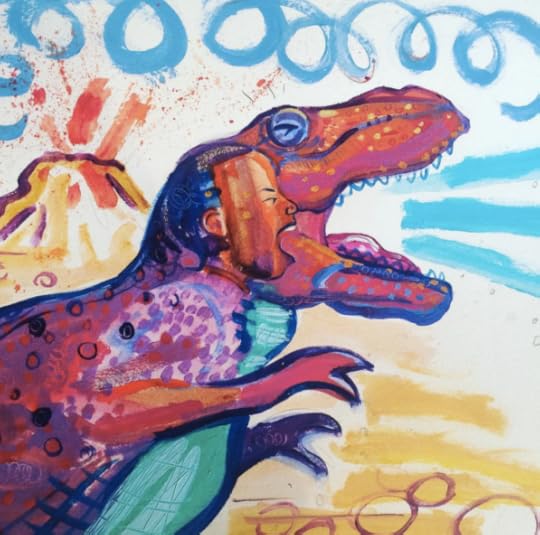 Some kid on the playground was going on about the monster under his bed. Hah.
Some kid on the playground was going on about the monster under his bed. Hah.I know where a real monster lives.
In my belly.
It’s like a T Rex taking over my body, jaws opening wide for a prehistoric roar.
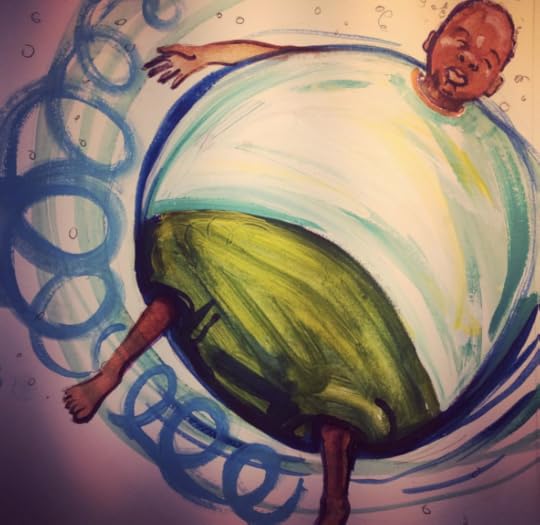 Like a gas bubble, stretching me until I’m a balloon about to pop.
Like a gas bubble, stretching me until I’m a balloon about to pop.
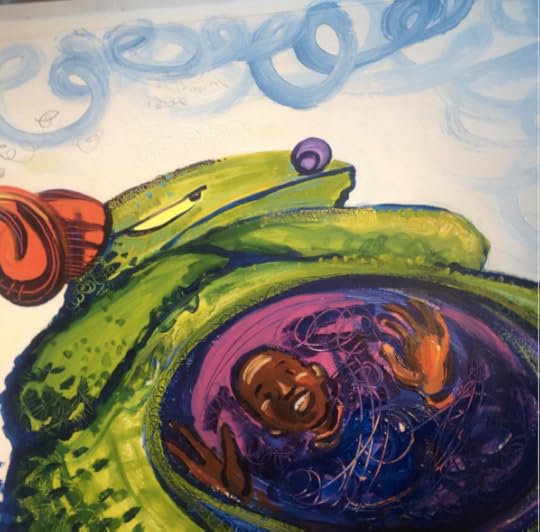 The monster always thinks this will be the time it shocks my mother…
The monster always thinks this will be the time it shocks my mother…
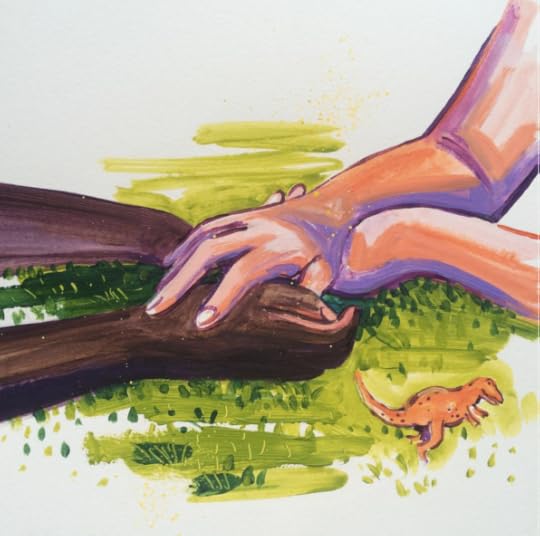 She plops down with me. “Forever means always. Longer than you can imagine. Longer than even I can imagine.”
She plops down with me. “Forever means always. Longer than you can imagine. Longer than even I can imagine.”My “okay” is kind of wobbly…
February 16, 2016
Not really about doing
I have learned how to be content with whatever I have. I know how to live on almost nothing or with everything. I have learned the secret of living in every situation, whether it is with a full stomach or empty, with plenty or little. For I can do everything through Christ, who gives me strength. Even so, you have done well to share with me in my present difficulty. (Philippians 4:11-14, NLT)
Paul here is thanking the Philippian church for sending him material help of some kind, most likely while he was in jail (as to which time he was in jail, there is no agreement). Essentially, he’s saying, “I’ve got Jesus, so I’m not in a panic about how things are right now, even though they’re not going well, but you are fine and generous people to want to take care of me.”
This is the context of a triumphal verse also translated as, “I can do all things through Christ, who strengthens me,” often quoted as a push to overcome obstacles, to do great things, to become a high achiever. But seen within Paul’s story, it isn’t about overcoming or achieving or greatness. It may not even really be about doing.
endure I can endure all things…
thrive I can thrive despite anything…
bear I can bear anything…
It’s tough to come up with an alternate word, because the tone of the passage implies neither soaring success, nor white-knuckled, teeth-gritted survival. Paul is content.
This verse is less about what he can do, and more about who he is.
No matter what his circumstances, he is the adopted brother of Jesus and son of the God who created the universe. No matter what, he is resting in that grace. So he doesn’t rely on his circumstances to tell him what his worth is. He is content whether he’s staying with friends who take care of him, confined to a dungeon jail, surviving a shipwreck, fleeing an angry mob, or speaking to fellow believers. He is content enough to, after receiving a beating, sing while in jail, and when an earthquake destroys the building, stay put so the jailer doesn’t suffer because all his prisoners have escaped.
So how does Christ give him strength to be content like that?
It’s a mystery that can only be solved by asking for strength yourself.
(Thank you to Steve Austin for his insights: I don’t want to do all things.)
February 9, 2016
The only way out is through
We have the plague.
Okay, not the actual plague, but both of my children have wicked intestinal bugs that are not resolving quickly, like good viruses are supposed to.
And there’s nothing I can do. There’s no medicine that will make their illnesses shorter, no way to help them need the bathroom less often. They’re teenagers now, so they can mostly know when the bad stuff is coming, and can take care of it themselves (no more sound of vomit hitting the floor as heard through a baby monitor, a sound that I will never forget and that haunts me to this day).
It reminds me of the post I wrote a couple of weeks ago, that included the phrase, The only way out is through. I said those very words to my grey-faced son a few minutes ago. Indeed, as with so many things, the only way out of this illness is to let it takes its course — as if we have any choice in the matter…
Yes, I’m trying to make them as comfortable as possible. I’ve got Saltines and Gatorade and applesauce and many other plain foods available for whenever they’re ready. I’m nagging them about drinking something, anything, both to guard against dehydration and to give them something to throw up (because it hurts less to throw up something than to keep throwing up nothing). I’m running up and down the stairs in response to their texted requests for highly important items like computer and phone chargers. I’m doing all their laundry (one of my standard responses when the plague enters the house). And I’m washing my hands as often as I can and disinfecting the living daylights out of the house.
Don’t laugh. We may need to resort to the flame-throwing level of cleaning soon.
I send you thoughts of good health. And if that fails, good humor.
February 4, 2016
The Linnet Girl
[This is a 2500-word Fairy Tale about a psychic, involving a birthmark, that I wrote for the NYC Midnight Short Story Competition. Enjoy 
ETA: I came in fifth in my heat, which qualified me through to the next round!]
Once upon a time, a peasant couple was expecting their first child, and not a soul was happy for them. Cador was a weasel of a man, sharp-toothed and sneaky. People never saw a mark on his wife, but Tressa had as much substance as a shadow.
Her labor came on at the village well, so the women did their duty, even though they didn’t like her, and sent for the Sisters and bustled her home. When they got there, she pulled away and lowered herself onto a rough straw pallet on the far side of the hut, opposite the fire. They tried to make her some tea, at least, but they found neither wood in the fireplace, nor a tin of tea. Every counter was bare and every cupboard door was locked. No wonder the poor girl’s cheeks were still hollow.
As soon as the midwife, Brenna, arrived, the women fled.
Tressa didn’t let Brenna touch or examine her, but squatted on her pallet, her head bent, silently enduring the harrow of labor—until her husband’s boots scraped at the threshold, and she whimpered. Just once. The midwife almost missed it.
Brenna braced herself for an ugly scene, but he gave them a mere glance before unlocking the cabinets, making a fire, and cooking himself supper. When he was finished, he slopped cold water on the leavings and grunted to indicate it was for the women.
That a woman needed peace during this time was the only reason the midwife didn’t rail against Cador for eating like a king and giving his wife gruel while she went to the brink of death to birth his child.
When the time to push came, Tressa threw off her clothes as if they were keeping the baby in, revealing what she kept hidden.
Bruises. Burns. Some long healed. Some fresh.
The midwife’s spirit turned to flint that was just waiting to be struck so it could burst into flame, but that had to wait: the baby was crowning.
A daughter.
Why? Why would the Powers That Be put a girl in this family? Brenna tried to bury her rage and terror with after-birth work, but when she went to pick up the baby to clean her, Tressa’s trembling hands were in the way. The midwife looked into the new mother’s eyes and saw a forest fire’s worth of rage and terror, overwhelming her candle’s worth.
So when Brenna had the newborn in her lap, and she was wiping the white fuzz off the little face, she whispered ancient words and watched as a red stain bloomed wherever she moved the cloth: from the baby’s forehead, down her left temple, across half her cheek, and in a thin trail down the side of her throat, spreading again at the shoulder. She shook out the cloth, breaking the spell. “Don’t you want to see your little girl?”
Cador came from the warmth of the fire he’d been hogging, took one look at the ruined skin, and leaned over his wife. “You laid with the Devil, you little—”
“No.” Brenna drew herself up to her full height, challenging him to do the same. She smirked as she looked down on him. “The Devil doesn’t go for weak, downtrodden women like your wife, but this is his mark. He will keep an eye on this little one.”
“Macha.” It was barely a whisper, but it was clear: Tressa wanted her defenseless daughter named for a goddess of war.
“Yes, the Evil One will keep his eye on Macha.”
“How do you know him so well?” Cador’s tone was nasty.
“The Sisters make it their business to study evil,” Brenna fixed him with a pointed stare, “of all kinds.” She lifted the baby until it was level with his face. “This stain is a promise that if you lay even one finger on her, he will come for you and you will be his entertainment.”
If the midwife had known how literally he’d take that order, she might not have had the courage to stain Macha, because he took it farther than not hurting her: he didn’t touch her at all. Ever. And didn’t let her touch him. Out of fear of her husband, even Tressa stopped being tender with her as soon as she was weaned.
That’s how it goes with gifts: there is blessing; there is pain.
As soon as she could toddle, Macha escaped to the woods. At first it was big and scary, but the animals were curious and came closer and closer until the heartbroken girl could pet them. Soon enough, they snuggled against her while she napped on the moss. Her favorites were little birds called linnets. Like her, they were plain and unremarkable, except for the blush on their heads. After she found an injured male and nursed him back to health, he became her friend and often sat on her shoulder. When he mated, his children grew up trusting her. And his children’s children. Whenever she needed comfort, she called on her linnets, and they came.
By the time she was six, her father had declared that not only was she cursed, but everything she touched was cursed, so she wasn’t allowed to help her mother and learn the things good daughters did—not even fetching water. She blamed her stain for making her useless as well as unlovable.
Time did not improve her looks. Nobody could say, “She’d be so lovely if only…” No, she was plain. Her skin was walnut brown from all her time outdoors, which lessened the impact of the stain, but not much.
When she was thirteen, she fell so ill she couldn’t move from her pallet. After only two days, while Tressa was at the well, Cador wheeled the handcart into the hut and ordered Macha to get in. It reeked of dung, but she had no choice. Once outside, she whistled, and her linnets came. What a sight they were: the weasel-man pushing a cart with his daughter in it, both girl and cart covered in little brown and blush birds. He didn’t shoo them away out of fear that she’d turn them and their scores of blunt beaks on him. Poor girl, she didn’t even know she could’ve done it.
They trudged half the morning before he steered her up the walk of a manor house and banged on the front door. When one of the Sisters answered, he dumped Macha on the stoop. “You brought her into this world, now you can usher her out.”
It must’ve taken him the entire walk to come up with that poetry.
The Sisters nursed her back to health, not that it took much, just regular food, clean water, rest, a few herb tinctures, and time. None of which she would’ve gotten in the hut only a cruel person would call her home.
After she’d been there a month, and was well enough for daily walks, the Sister who’d brought her into the world joined her. “Do you know you could stay here?”
Macha’s steps faltered. “Stay here? To pay for you healing me?”
“No, no, child.” Brenna put her hands behind her back and stared straight ahead so as not to frighten Macha. “To learn and become one of us.”
“Nobody will want me to attend their birth. Not with this curse.”
It took all Brenna’s training not to shout and stamp her feet. “Your stain is not the result of a curse. You have been told lies and fed silly superstitions. Please tell me you didn’t believe them.”
Macha whistled and a linnet landed on her shoulder. “It’s all I know.”
“What about the testimony of the birds? And your other forest friends?”
“They’re just animals.”
“Wild animals. That don’t need you. But they love you.” Brenna whistled and a crow came and perched on her shoulder. “They do have excellent taste in people.”
That made Macha laugh. It was the first laughter they’d heard from her, and may have been the first time any human had heard joy from her lips.
After walking a while, Macha said, “Curse or not, people don’t want me near them. If I can’t midwife or go around to the villagers, what could I do?”
“You could assist the Sisters who mix our herbs by heading into the woods to collect the raw materials and learning how to mix them.”
Could Macha really tramp around outside as she loved to and be useful? “I already know a lot about plants in the woods.”
“Good. You could teach us some things, too.”
Macha tried to talk herself out of it, but every argument turned into a plus on the Sister’s side. All but one. “They say you’re witches.”
“They’d be right.” Brenna shrugged as if to say, “So?”
What could she say in the face of such bald acceptance? Macha decided to go back to her parents and return when she was ready.
She was ready as soon as she crossed the hut’s threshold and saw her father at the fire eating thick stew while her mother waited on her cold pallet for her thinned scraps. Macha’s conviction gave her the courage to feel.
Cador broke the silence. “You’re alive.”
“Sorry to disappoint you.”
Her parents stared as if she’d grown wings; she’d never talked back before. The experience was both exhilarating and terrifying. She strode over to Tressa, sat, and revealed the relative bounty of bread, cheese, and sausage from the Sisters. “Let’s have a decent meal for once.”
“Ungrateful turd,” Cador spat. “Who’s fed you all these years?”
Masha snorted. “Not you. You’ve begrudged me food. The woods have fed me.”
“If you think you can talk to me that way…”
She tuned out his rant while she ate and waited for him to finish. “Don’t worry. I’m leaving. The Sisters are going to teach me herbs and healing.”
“Thank the Powers,” her mother said. “If you stay, he’ll sell you into a marriage like this.”
“That’s not going to happen,” Macha said.
“Leave now.” Tressa’s voice was urgent. “Don’t even wait until you’ve eaten.”
“But you need to eat for once.”
Cador’s voice was low and dangerous. “What kind of witchcraft is this?”
He came closer; her mother put her hand over her daughter’s and Macha was assaulted by three distinct images of her mother smothering the babies who would have been her siblings.
Macha whispered, “You killed them all?”
“I saved them all.” Tressa’s eyes contained pride—no guilt, no remorse. “I would’ve saved you, too, if the midwife hadn’t been there until he showed up.”
Finally, Macha realized that although she’d heard her mother’s voice, Tressa’s lips had not moved this whole time. Heat rose in prickles from her chest, up her neck, to her face, deepening the color of her stain. She stood and rounded on her father. “You! You did this to her.”
“Careful what you say, girl.”
“No! I will not be careful!” Macha was hit with another vision, this time of her father loading her mother’s dead body onto the handcart. “You’ll get your way soon enough. You will kill her and bury her in the woods, and they will run you out of the village and you will die a filthy beggar.” She was panting and sweating and in danger of losing the little bit of food she’d eaten. Where were these visions coming from? How did she know they were true?
While her parents were frozen from shock, Macha snatched the food and her cloak and bolted out of the hut, pausing only briefly in the woods to gather her treasures. She called her linnets to her while she hiked back to the manor house.
Brenna heard the commotion of Macha and the birds long before they would’ve come into view, so she went out to meet them.
“I can see things.” Macha’s words came out in a rush. “Horrible visions of the past and the future. I can hear my mother when she doesn’t speak. What is happening to me?”
“What was different about seeing your parents this time?”
“I let myself get angry. Before I always tried to feel nothing.”
“Your strong emotions have a revealed a gift we didn’t know about.”
“Gift!” Macha shrieked and the linnets joined her. “Did you give it to me?”
Brenna calmly held Macha’s wild gaze. “I didn’t give you this gift. Can you look into me?”
Macha saw her perfect infant skin marred as Brenna moved her cloth over it. She sank to her knees and touched the left side of her face. “How could you?”
“To protect you from your father.”
“That’s why my mother killed my siblings. How is what you did different from that?”
Brenna sat next to her in the dirt. “Only by degree. It’s a hard call. As we learn to use our gifts, we have to learn our values at the same time. What will we use it for? What will we not use it for?”
The Sisters taught Macha to use her gift of sight so she didn’t need to be in a high emotional state to let the visions come. She learned to recognize the wisdom nature had been teaching her all along. At first, she worked with the herbs, but in time, as her spirit healed and she grew accustomed to the company of the Sisters, she realized it was time to stop hiding. Her work at the manor house was done, and she became a fortuneteller in a traveling circus, where she learned to read human society as she’d learned to read animal society.
She was still no beauty, but with proper feeding, she did develop a magnificent bosom, which she enjoyed displaying to great advantage in her circus costume.
When she was twenty, her fame had grown such that a Prince followed the circus with all his retainers, just to have access to her, because everything she told him was true, and nobody told princes the truth. At first, he offered her marriage, in the hopes a wedding would bring peace to his palace. She laughed, because she couldn’t reconcile the word “peace” with the word “marriage.” But she agreed to be his advisor, so he installed her into her own suite of apartments at his castle. Due to her wise counsel and her ability to tell who was lying and why, and see what they were desperately hiding, the Prince became King, and peace did reign in his land.
Some people hearing this tale might wish that the part with the Prince had been the main story, but that was not the part Macha liked to tell. She was proud that she’d survived her childhood. Proud that she’d learned to manage both the blessings and the pain of her gifts. Proud of facing the world unashamed. That a Prince noticed was rather beside the point.






